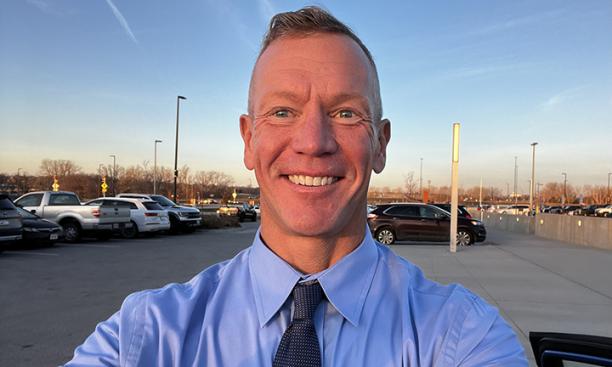
As a freshman in Air Force ROTC at Princeton, Jake Porter ’90 was allowed to switch out of the engineering school if he would commit to working with the service’s intercontinental ballistic missiles (ICBMs). He agreed, and he’s spent much of his career on ICBM bases in a range of jobs from working in missile silos to training young officers and overseeing maintenance of the missiles and launch control centers.
Upon graduating with a degree in economics, Porter was commissioned as a second lieutenant, and that fall he reported to Vandenberg Air Force Base (recently renamed Vandenberg Space Force Base) in California for training before being sent to Francis E. Warren Air Force Base near Cheyenne, Wyoming, to serve in the silos.
At Princeton, Porter says, he didn’t focus on the responsibility he would be entrusted with. “But as you’re going through your training and you learn what the weapons are capable of,” he says, “it hits home a little. Each person has to deal with that in their own way. My line of thinking was, if I were ever called upon to participate in a launch, that would mean the world had gotten to a state where we were launching in response to an adversary’s attack.”
For four years, Porter worked about eight 24-hour shifts, called alerts, each month with a partner. The Air Force’s ICBM launch control centers are spread across a huge area, and it can take between 45 minutes and more than two hours to drive from a base to a launch control center. Once there, Porter says, the two officers on duty go through security procedures, take an elevator down to the silo itself and enter via a massive blast door.
“It’s a very confined space,” Porter says. “During the working hours, you spend a lot of time dealing with maintenance teams that are working on the missiles.” When he was serving in the silos, Porter says, the Air Force had a master’s degree program for missileers, and he earned a degree from Lesley College in business administration.
“I anticipated getting out after my four-year commitment,” Porter says. “But I loved the mission I was involved in, I loved the location I was in and the potential opportunity for other locations, and I can’t say enough good things about the people I worked with.”
Instead of leaving the Air Force, he spent three years as an instructor at Vandenberg and then returned to Francis E. Warren for a three-year tour in its emergency war orders vault. He did a third tour at Vandenberg as well as tours in Malmstrom Air Force Base near Great Falls, Montana, where he was responsible for all the maintenance teams that went to the missile field, and at Nellis Air Force Base near Las Vegas, where he helped deactivate a squadron and ship its munitions to other locations.
Porter retired from the Air Force in 2010 and taught Air Force Junior ROTC at a high school in Pennsylvania in order to provide stability for his son and daughter while they were in high school and college. He retired from teaching Junior ROTC in 2019.
Shortly thereafter, the Twentieth Air Force, a command headquartered at Francis E. Warren whose primary mission is ICBM operations, was looking to hire a deputy director, Porter says. He and his wife Andrea had enjoyed their two tours in Cheyenne and talked about retiring there, and in 2020 he took the job, a civilian position.
Now, Porter is part of a staff charged with keeping senior leaders informed of issues and providing them with decision-level information. The staff is also starting to plan for the replacement of the Minuteman III ICBM, which went into service in 1970, with the Sentinel weapon system.
“Civilians don’t move as frequently as the active-duty military,” Porter says. “My presence here provides some continuity and allows the Air Force to give active-duty members the resources to lean on as they move into our headquarters staff for durations of one to two years.”
